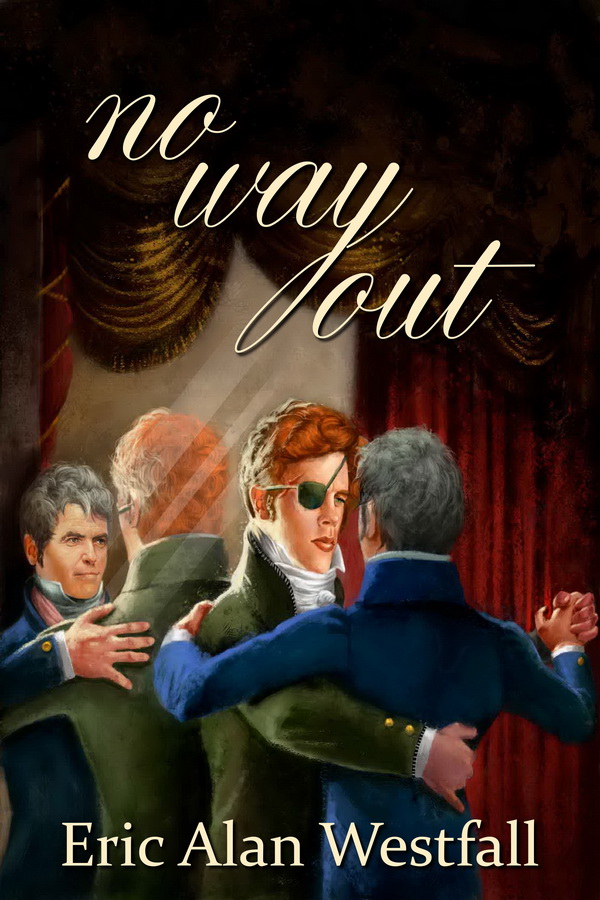
It’s April of 1816 in Another England.
And Jeremy—a whore from the Dock—is living in a guest bedroom at the London home of the (in)famous Iron Marquess, with over fifteen days missing from his life.
For someone who remembers everything from his third birthday on, it’s unnerving not to know. Fine, fourteen days for the coma and the infection delirium. But those first thirty-six hours. Do they explain how he got hurt, how he got to Ireton House, and why his lordship’s mountain-sized valet is taking care of him? Or why his ironness looks at him with nothing iron at all in his eyes?
Jeremy and the Iron Marquess both have dark secrets. Forced engagements, an inheritance, a scheme to clap Jeremy in Bedlam, the revelation of the missing hours, a problem with plumage, some numbered accounts, and a long sea voyage, all seem to mean there’s no way out of the snares surrounding them. Or is the old saying true: where there’s a waltz, there’s a way?
All royalties will go to a local LGBT organization.

Eric is giving away two backlist eBooks (ePub or mobi) to one luck winner. Enter via Rafflecopter:
From Chapter 9: The Second Visit
JEREMY
16 April 1816
9:45 a.m.
Ireton House, London
Ah. The baron was capable of controlling himself—in circumstances where he was not in sole command of place and people. The flush receded, but did not vanish. “There is the matter of your debt.”
“So. I did not take an advance on my inheritance? An allowance of sorts for all the allowances I never had?”
“You mean your theft? Stolen from my locked money box? No.”
My right arm moved in a gesture encompassing my wound, my attire, my location. “I have no funds at hand, baron. As you see. But you will be repaid.”
Scarred, half-blind men do not do well whoring on the Docks. Oh, they would be used, but their holes were worth far less than if the holes were in a whole man. I had no present way…. Except I did.
The baron had the same thought. “You offered the pittance your grandfather left you as repayment. Are you still of the same mind?
For a moment I wished the baron wouldn’t care about a damned fifty pounds, an acknowledged pittance compared to his wealth. The moment vanished; reality set in. He cared. “Of course.”
“So there is no misunderstanding about what has been agreed, you will have no objection to signing—” His eyes flashed to my face as his hand reached inside his jacket to pull out a folded sheet. “You can still write?”
You bloody fool. “I have one good eye, two working hands, and a functional mind.”
Still without the courtesy of speaking directly to our mutual host, he said, “”Do you have pen and ink we might use, Lord Ireton?”
Of course he did. He was wealthy enough to have pens, ink, paper and envelopes—perhaps even pre-franked envelopes—in every room in the house, including the smallest room in the servants’ quarters on the fourth floor, if he chose.
His reply stunned both of us. “No.”
The response was enough to get the baron to face him. I was already looking, so once the baron’s back was to me, I let my gawk show. He cut off whatever the baron might have been about to say with the look I wished I had. And the power to make the look effective.
“I will, however, send for them, if Mr. Davies wishes to sign before he has his solicitor examine the agreement.”
“He needs no solicitor to sign something prepared by his father!” the baron snapped.
I almost blurted words about having no solicitor, about signing, but something—some infinitesimal spark in Ireton’s eyes aimed only at me—stopped me. I substituted, “You’re right, Lord Ireton.”
Although the baron turned again, it was slower, and he was far more composed in both body and face than I expected. He put the paper back in his pocket as he moved.
“If a father’s word is insufficient—” There was a pause as he realized the logical rest of the sentence would include a “son.” Did he know if he dared say it, I might well project vomit across the room into his face? He might or might not, but he avoided the word. “I will leave you to think it over. I will return at another, more convenient time.”
“Yes.”
The baron attempted no affability, as the pretense would be so much of a volte face as to be insulting, but he gave Ireton the stiffest, minimal bow Ton manners would allow. “I will take my leave, Lord Ireton. Another time.”
“Another time.” Ireton was all courtesy as he opened the door and gestured the baron into the hall.
By sheerest happenstance—of course—Harris and Carleton were outside. They gave sterling renditions of surprise when the door opened.
“Carleton,” Ireton said, “if you would escort Lord Enderby out? Thank you. Harris, bring the dose of laudanum Dr. Pritchard prescribed for Mr. Davies when he has undergone some stress. We do not wish a setback.”
The baron’s face was not visible, but I knew he would be annoyed at the jab, and frustrated at being unable to respond. Although there was no prescription, as Ireton and I knew well.
Ireton returned, approached the bed, looked down at me with gentleness I would not have believed possible before he held me with such care when I fell apart.
“Well?”
So many phrases which might go with the word. “Are you?” “What did you think?” “What next?”
I answered all three. “Not very. I’m not sure. I don’t know.” And grinned at him.
He blinked slowly—his only reaction to my nonsense—then gave me another, or perhaps yet another, smug look. “You’re not feeling well. You’re unsure of your reaction to the baron’s visit. And you don’t know what to do next.”
In any other man, the look following the words would have been a somewhat overbearing “Ha!” but the Iron Marquess wouldn’t stoop to teasing.
Would he?
I didn’t ask.
“I think, my lord…I think I need to be alone now. May I, uh, send you to the right-about?”
He graced my teasing with a smile. “Of course. I meant what I said about this being your room. But before I go, would you mind one question?”
I shook my head.
“Did anything strike you as…odd…about the baron’s departure? Or the last few moments leading up to it? My apologies. I’ve asked two questions. The overbearingness of iron, I suppose.”
I didn’t want to think about it, but I’d agreed to answer. I stepped into my hallway and watched the meeting unfold, but without immersing myself in it. I came back, sighed, focused on Ireton. “Something was odd. He was humiliated by both of us several times, as he perceived events, but he maintained, or gained, control of himself and left in a somewhat calm fashion. He never lets a slight go easily, without even a threat of consequences.”
“My assessment of him, too, though we’ve spoken only a few times. Well, I said only two questions, so I’ll leave. We’ll need to talk about this oddness later, I think.”
I nodded. He gave me a slight bow, turned and left.
Eric is a Midwesterner, and as Lady Glenhaven might say, “His first sea voyage was with Noah.” He started reading at five with one of the Andrew Lang books (he thinks it was The Blue Fairy Book) and has been a science fiction/fantasy addict ever since. Most of his writing is in those (MM) genres.
The exceptions are his Another England (alternate history) series: The Rake, The Rogue and the Roué(Regency novel), Mr. Felcher’s Grand Emporium, or, The Adventures of a Pair of Spares in the Fine Art of Gentlemanly Portraiture(Victorian), with no way out(Regency) coming out a month after Of Princes.
Two more fairy tales are in progress: 3 Boars & A Wolf Walk Into A Bar(Eric is sure you can figure this one out), and The Truth About Them Damn Goats(of the gruff variety).
Now all he has to do is find the time to write the incomplete stuff! (The real world can be a real pain!)
Author Facebook (Author Page): https://www.facebook.com/Eric-Alan-Westfall-1045476662268838
Author Twitter: https://twitter.com/eawestfall43




